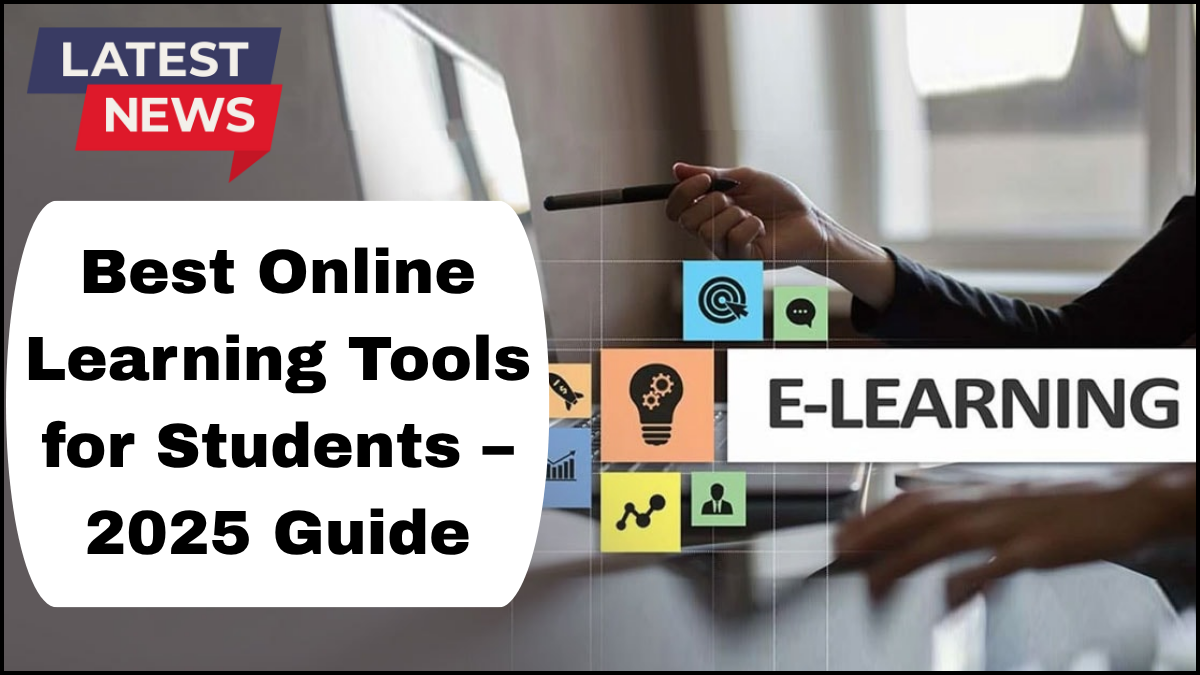In 2025, the landscape of digital education has evolved into a highly dynamic and personalized experience. With the rise of artificial intelligence, adaptive learning systems, and immersive technology, students now have access to more powerful and intuitive online learning tools than ever before. This guide explores the best platforms and resources that are shaping the future of education and helping learners stay ahead in an increasingly competitive world.

Why Online Learning Tools Matter More Than Ever
Online learning tools in 2025 are not just convenience-driven; they are essential components of modern education. These tools bridge the gap between traditional classrooms and remote, self-paced learning, enabling students to tailor their education to individual needs, goals, and schedules.
From K-12 students to college learners and lifelong skill seekers, digital platforms are now integral to how we access and process knowledge. Whether it’s interactive video courses, AI-driven tutors, or project-based learning communities, the goal is simple: make learning more engaging, effective, and accessible.
Top Online Learning Tools in 2025
Here’s a breakdown of the top online learning tools students should consider this year:
1. Khan Academy
Still a staple in online learning, Khan Academy continues to offer free, high-quality lessons in math, science, history, and more. In 2025, their content is enhanced with AI-based personalization, allowing students to follow custom learning paths based on their strengths and weaknesses.
Why it’s great:
-
Free and comprehensive.
-
Ideal for foundational learning.
-
New adaptive features adjust to student performance.
2. Coursera
A leader in digital education, Coursera partners with top universities and companies to offer certificates, degrees, and skill-building courses. Their 2025 platform uses advanced analytics to recommend courses and integrates hands-on labs with real-world simulations.
Highlights:
-
Career-aligned learning paths.
-
AI mentors for feedback and coaching.
-
Top-tier institutions like Stanford, Google, and Yale onboard.
3. Duolingo Max
Duolingo has upped its game with “Duolingo Max” — a version powered by GPT-4 and AR features. It makes learning languages deeply interactive, incorporating real-time conversation practice and gamification.
Benefits:
-
Perfect for language learners of all levels.
-
Short, engaging lessons with instant feedback.
-
Visual and auditory learning for retention.
4. Notion
Notion is more than just a productivity app. In 2025, it’s a full-fledged academic tool. Students use it to organize notes, manage tasks, create study databases, and even collaborate on group assignments with AI-assisted brainstorming and writing support.
Why students love it:
-
Centralizes coursework and study plans.
-
Powerful templates and calendar integrations.
-
AI writing assistant for outlining and summarizing.
5. Brilliant.org
For students focusing on STEM subjects, Brilliant’s interactive problem-solving approach is unbeatable. In 2025, Brilliant features hands-on challenges, explainer videos, and real-time hints — making it ideal for critical thinking and analytical skill-building.
Best for:
-
Math, science, logic, computer science.
-
Learning by doing — not just reading or watching.
-
Encouraging independent reasoning.
6. Quizlet with AI+
Quizlet has introduced AI+ in 2025 — transforming simple flashcards into smart, adaptive learning tools. It tracks your progress and suggests the best way to retain information using spaced repetition, memory science, and gamified tests.
Key upgrades:
-
Smart quizzes that focus on weak areas.
-
Visual learning modes (diagrams, flowcharts).
-
Teacher-generated content and class-sharing.
How to Choose the Right Tool
When selecting online learning tools in 2025, students should consider the following:
-
Learning Style: Visual, auditory, or kinesthetic? Choose tools that match your preferred way of learning.
-
Goals: Are you preparing for exams, learning a language, or upskilling for a career?
-
Budget: Many platforms offer both free tiers and premium subscriptions. Look for student discounts or institutional access.
-
Device Compatibility: Ensure the platform works smoothly on your device (mobile, tablet, laptop).
The Future of Digital Education
As online learning tools in 2025 become more sophisticated, the boundaries between formal education and self-directed learning blur. Students no longer need to rely solely on textbooks or rigid syllabi. With on-demand videos, live tutoring, peer communities, and adaptive testing, learning becomes a continuous, fluid experience.
Moreover, the integration of augmented reality (AR), virtual reality (VR), and AI tutors means students can now engage with complex concepts in ways that feel natural and immersive. Whether you’re dissecting a virtual frog or coding an app in a simulated environment, digital education is now hands-on and deeply interactive.
FAQs
What are the best free online learning tools in 2025?
Khan Academy, Notion, and Duolingo (basic version) remain top free choices. They offer high-quality resources without requiring payment.
Are online learning tools as effective as traditional classroom learning?
Yes — especially when used intentionally. Many tools now offer personalized feedback, practice tests, and real-time collaboration that mimic and even enhance classroom dynamics.
Can online learning tools replace teachers?
No. These tools are designed to support and extend teaching, not replace it. Human guidance, mentorship, and emotional intelligence still play vital roles in student success.
How do I stay motivated with self-paced learning?
Set specific goals, use apps like Notion to track progress, and choose platforms that reward consistency (like streaks in Duolingo or XP points in Quizlet).
click here to learn more